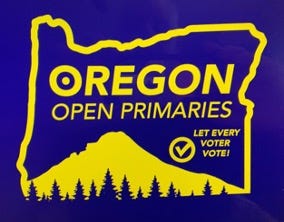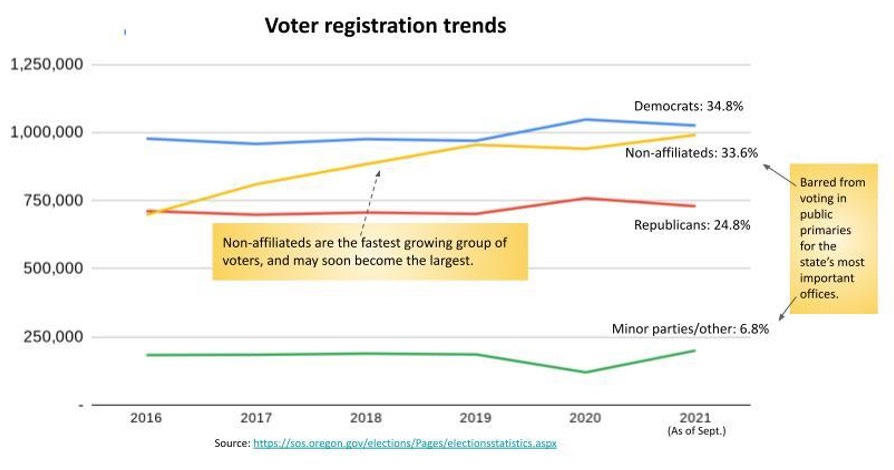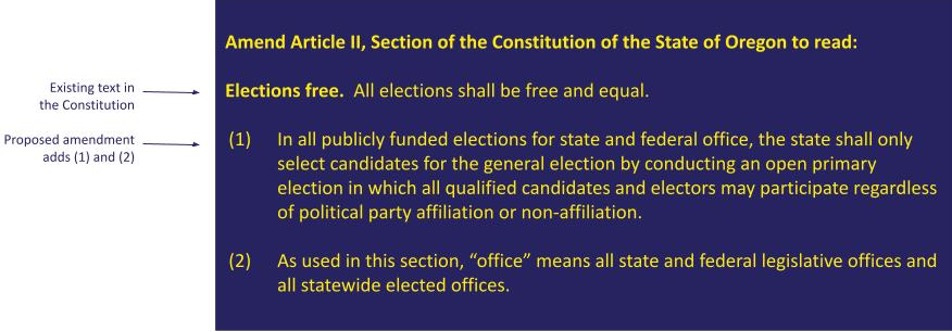Prying open our closed primaries
A citizen initiative aims to let in the unaffiliated
Oregon’s primary system suppresses the participation of a large and growing share of voters. It inhibits candidate competition, skews election results and complicates the electoral process.
A citizen initiative takes a new approach to opening closed primaries: amend the Constitution to guarantee voter and candidate rights as a first step. It is sponsored by Oregon Open Primaries, a nonpartisan team of volunteers.
Oregonians—including party members—agree that our primary system no longer works for us. They want all voters to decide which candidates will be on the November ballot. But they have not agreed on the approach to doing so. In 2008 and 2014, citizen initiatives to open primaries failed because of design issues and party resistance.
Voters and candidates unaffiliated with a major party are ineligible to vote and compete in taxpayer-funded primaries for gubernatorial, congressional, and legislative offices. Our primaries are effectively publicly funded nominating contests benefiting the two major parties. Oregon is one of nine states with such a closed system.
The Oregon landscape has changed dramatically because of the growth in voters not registered as Democrats or Republicans. Forty percent of our nearly 3 million voters have no voice in primaries for the state’s most important offices.
Non-affiliated voters are on pace to become the largest group. Their median age is 15 years younger than major-party registrants, and they are a growing force in all parts of the state.
General-election results are skewed by partisan primaries. In our polarized era, primary candidates appeal to their party’s base, not the broader electorate. With an open primary, consensus candidates would more likely reach the general-election ballot.
Oregonians have shown a dedication to democratic participation. Oregon was the first state to conduct elections by mail-in ballots. In 2015 it enacted “motor voter.” But its closed primary has changed little in a century.
The proposed constitutional amendment is straightforward and nonpartisan. It would supplement the “free and equal elections” section of the Oregon Constitution to confer the right of all voters to vote and all qualified candidates to compete in primaries regardless of party affiliation or non-affiliation. That’s it.
The amendment doesn’t prescribe how open primaries would be conducted. It doesn’t specify how candidates would be presented on the primary ballot, or the maximum number of candidates that would advance from the primary to the general election, or the voting method that would be used. The amendment focuses on guaranteeing access for voters and candidates. The legislature then would be required to devise statutory changes to restructure the primary process and end partisan limits on participation.
Why this approach? First, this initiative is readily understood. It has broad appeal across age, region and political allegiance. It sidesteps process reforms that could be used to confuse voters and derail the initiative. Second, voter and candidate rights are secured in the constitution—they could be changed only by voters. And third, it focuses on first things first—the rights of all voters and candidates—and pushes process design to the legislature, which is best positioned to deliberate on the particulars.
After passage, we will work with the reform community to propose statutory reforms. Every model should be on the table. Let’s have a robust discussion after the legislature is forced to act.
Sometimes slower is faster. This two-step approach will take a few years, but the likelihood of achieving equitable primaries is greater. It has risks: The legislature may not act, or act but fail to root out inequities and party preferences. But voter approval will press the legislature—which isn’t without proponents of reform. Should it fail to act, there would be recourse to a second initiative and court challenges.
The time has come to LET ALL OREGON VOTERS VOTE!
Mike and Ed are Team Members of Oregon Open Primaries.









I strongly support creating a more efficient system for conducting an open primary than we presently have, which could be simply accomplished by allowing non-affiliated voters to request a ballot online (just as they could change their party if they chose to do so) rather than mail in their request to their county clerk in charge of elections or make that request in person. Our present approach puts too much burden on those who must mail in their requests in a timely manner and on the counties that must process these requests. Allowing non-affiliated voters an online opportunity to participate in a major party's primary when that party chooses to hold one respects the nature of party politics and those who choose to participate. What the writers here propose undermines the integrity of each party by taking away their right to operate as they choose. We have minor parties, as well, that can run their own candidates or choose to support a candidate also running with the endorsement of a major party. This proposal violates the integrity of these parties, as well. Perhaps this upcoming election will convince our legislators to pass a bill to make our present system for allowing open primaries to be efficient enough to work as they should. Again, I support open primaries, but not of the kind proposed in this piece.